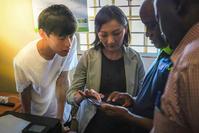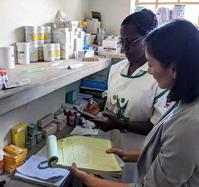Yih & Wang follow up Uganda healthcare project
Yih & Wang follow up Uganda healthcare project
Yuehwern Yih is a professor of industrial engineering, associate director of the Regenstrief Center for Healthcare Engineering, and academic director of the Long-Term Assistance and Services for Research (LASER) – Partner University-Led Solutions Engine (PULSE). In November 2017 she received Gates Foundation Grand Challenges Explorations (GCE) funding for her project, "Demand sensing and digital tracking for maternal and child health in Uganda".
The goal of the project is to help save the lives of Ugandan mothers in childbirth by developing a better, more efficient supply system for essential medications and supplies. The project uses systems engineering concepts to track patient conditions, demands, and medical supplies to ensure the right medications are at the place at the time to save lives during childbirth.
Yih's team includes IE PhD students Dawei Wang, Rhoann Kerh, and Sungbum Jun. They are gathering critical supply data using an app they developed called E+TRA Health (Electronic TRAnsparency and TRAcking for Health). This electronic supply chain management system tracks healthcare commodities to predict patient demands and manage the supply chain. Her team is testing this solution at two Ugandan Level IV Health Centers (county mini-hospitals) to evaluate its effect on the efficiency of ordering and maintaining supplies and on patient outcomes.
The Level IV Health Center is located in Kojja, Uganda. Yih and Wang returned to Uganda for the third time from March 4-8 to troubleshoot the E+TRA Health system and get feedback from hospitals using the system.
"There were several problems such as intermediate power supply due to construction on site and a wifi signal strength issue," explained Wang. "We rebooted the system and trained the staff on site to troubleshoot the system if there is are any further signal issues."
Next steps for the project include updating the system based on feedback obtained during this trip, write reports of findings, and prepare to write a proposal for Phase 2 of the project.
This project involves a multidisciplinary research team, including researchers from Purdue IE, Purdue University's Regenstrief Center for Healthcare Engineering and the Global Engineering Programs and Partnerships' Shah Family Innovation Lab (formerly the I2D Lab), as well as the Management Sciences for Health (MSH) and the USAID-funded Resilient Africa Network (RAN).
Grand Challenges is a family of initiatives fostering innovation to solve key global health and development problems. In 2007, the Gates Foundation launched Grand Challenges Explorations (GCE) to engage more of the world’s innovators more quickly. Twice each year, GCE invites high-risk, high-reward proposals on a range of challenges to support innovative thinkers worldwide to help solve persistent global health and development challenges.
Related Link: https://engineering.purdue.edu/IE/news/2017/yih-gates-gce


